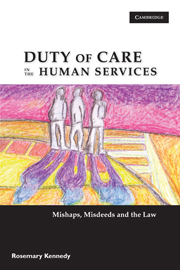Book contents
- Frontmatter
- Dedication
- Contents
- Acknowledgements
- Author's note
- Part 1 Positioning and mapping the territory of human service mishaps and misdeeds
- Part 2 Mishaps and misdeeds through a law lens
- Chapter 3 Public law of general application
- Chapter 4 Public law of particular relevance to the human services
- Chapter 5 Private law and suits
- Chapter 6 Private law – negligence
- Chapter 7 Private law – other torts and civil actions
- Chapter 8 Legal processes, quasi and indirect legal scrutiny
- Part 3 Mishaps and misdeeds through a human services lens
- Part 4 Mishaps and misdeeds through a unified lens
- Appendix: Finding the law and cases
- References
- Index
- References
Chapter 7 - Private law – other torts and civil actions
from Part 2 - Mishaps and misdeeds through a law lens
Published online by Cambridge University Press: 05 June 2012
- Frontmatter
- Dedication
- Contents
- Acknowledgements
- Author's note
- Part 1 Positioning and mapping the territory of human service mishaps and misdeeds
- Part 2 Mishaps and misdeeds through a law lens
- Chapter 3 Public law of general application
- Chapter 4 Public law of particular relevance to the human services
- Chapter 5 Private law and suits
- Chapter 6 Private law – negligence
- Chapter 7 Private law – other torts and civil actions
- Chapter 8 Legal processes, quasi and indirect legal scrutiny
- Part 3 Mishaps and misdeeds through a human services lens
- Part 4 Mishaps and misdeeds through a unified lens
- Appendix: Finding the law and cases
- References
- Index
- References
Summary
BEYOND NEGLIGENCE THERE is a range of other tort and civil actions that have current or emerging relevance to human services conduct. Some of them, such as the tort of false imprisonment, have already appeared alongside the negligence actions mentioned in a number of cases in the previous chapter. Luntz (2005) has argued that the intentional torts are more effective in protecting civil liberties than is negligence. It may be that human services cases in the future will feature these alternative torts or other civil actions more frequently. These actions have different requirements and advantages; for instance, in relation to onus of proof, necessity for damage, and statutory limitation periods, which may make them feasible when other claims, such as negligence, are not.
There are other possible developments or more obscure civil actions that may also be important in future legal responses to human services failures. Only a few are mentioned briefly in this chapter. ‘Actions on the case’ is an archaic umbrella term referring to a wide range of torts, of which negligence is one (Mendelson 2007). There is a subgroup of innominate actions on the case for acts that consequentially cause physical or mental harm (McGlone and Stickley 2009). A major example is where a defendant makes statements to another with the intention of shocking or frightening them, perhaps as a joke, and as a result mental or physical damage is caused.
- Type
- Chapter
- Information
- Duty of Care in the Human ServicesMishaps, Misdeeds and the Law, pp. 125 - 139Publisher: Cambridge University PressPrint publication year: 2009



